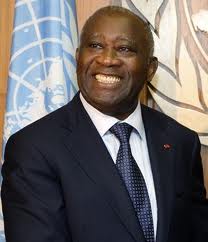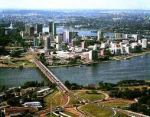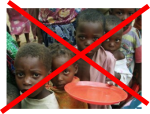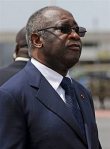Joy and tears were mixed in my heart yesterday as I saw our president, Laurent Gbagbo, the blessed child of Gagnoa, the former president of Cote d’Ivoire, land back in his homeland. 10 years of imprisonment, over 20 years of persecution, acquitted by the International Court of Justice at the Hague [Laurent Gbagbo and Charles Ble Goude: Totally Acquitted and Free at Last, Laurent Gbagbo, Former President of Cote d’Ivoire, Acquitted of War Crimes], and finally allowed to go home to the land of his ancestors. Gbagbo’s only crime has been to love his country and his people too much, and want dignity for them! Laurent Gbagbo is really like those of our kings, heads of state, leaders, who have been deported by the oppressors, the French colonizer, in this case via its puppet Ouattara [Deportation of African Heads of States]. We have fought, cried, and tirelessly worked for his freedom. Africa is proud of her son, Laurent Gbagbo. Just look at how many people took to the streets to welcome him home! Then Ouattara sent his troops to beat the people who came to welcome their president home, in the name of trying to prevent troubles. Such a coward! Our president is back! It does not matter what the future holds, today we are happy… we have made progress… Africa’s son is back… tomorrow will take care of itself. 10 years ago, when I watched as the presidential palace was being bombed by French troops, when I watched our president and wife being paraded on TV all over the world [Laurent Gbagbo: No to a complicit silence!], I could not have imagined today! I knew we needed to work hard, but today I will savor this victory. Why don’t these international media who yesterday felt no shame to show our president or his wife being paraded by the rebels on broad TV, why are they not showing his triumphal return today? why are they not placarding it the way they did when he was dragged out? Because it would show that they lost! Shame on the Mainstream Media, shame on them… shame on France… today we stand tall as our son is back. Today, we stand!
Tag: Cote d’Ivoire Conflict
Why the Name: Abidjan?
After walking on the sandy beaches of Abidjan, I have often romanticized the name of such a beautiful place, and no matter how much intellectual gymnastics I did, I could never decipher its meaning. After all, I do not speak the local language, but I somehow thought that it could have been a French name with some local texture to it; but which one?
Well, according to oral tradition of the Ébrié people as reported in the Encyclopedic Dictionary of Côte d’Ivoire, the name “Abidjan” results from a misunderstanding. Legend states that an old man carrying branches to repair the roof of his house met a European explorer who asked him the name of the nearest village. The old man who did not speak the language of the explorer, thought that he was being asked to justify his presence in that place. Terrified by this unexpected meeting, he fled shouting “min-chan m’bidjan“, which means in the Ébrié language: “I return from cutting leaves.” The explorer, thinking that his question had been answered, recorded the name of the locale as Abidjan.
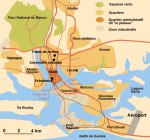
A slightly different and less elaborate version of the legend is as such: When the first colonists asked native women the name of the place, the women misunderstood and replied “T’chan m’bi djan“: “I’ve just been cutting leaves“. Thus the name Abidjan.
Originally a fishing village, Abidjan was made the capital city of the French colony after a deadly epidemic of yellow fever decimated the French colonists in 1896 in Bassam. In 1934, Abidjan became the third capital of Côte d’Ivoire after Grand-Bassam and Bingerville. It offered more opportunities for trade expansion, particularly with its greater wharf. In 1983, the capital was moved to Yamoussoukro, the village of then-president Félix Houphouët-Boigny. However, Abidjan has remained the political and economic heart of the country.
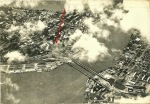
Today, Abidjan is Côte d’Ivoire’s largest city, and the third largest French-speaking city in the world after Paris and Kinshasa. The city is located in the Ébrié Lagoon on several converging peninsulas and islands connected by bridges. Abidjan is considered a cultural hub for most of West Africa, and Francophone Africa in particular. It has the biggest port in West Africa, and second largest port of Africa after the Lagos port in Nigeria. With the political unrest of the past decade which reached its paroxysm in 2011 with the French army bombing strategic places in Abidjan in order to impeach President Laurent Gbagbo (including the presidential palace), the city has been destroyed, and is today going through a rebuilding phase.
Affectionately nicknamed the “Manhattan of the tropics“, “Small Manhattan“, or “Pearl of Lagoons“, because of its impressiveness, Abidjan is a unique city perfect for business tourism. The place is so beautiful, that the French once considered making Côte d’Ivoire an overseas department of France; it is not so far from it today, but that will be the subject for another day. The video below is on Côte d’Ivoire as a whole. Enjoy!
Freedom at last? 12 high political figures freed in Côte d’Ivoire

Freedom at last for 12 high political figures in Côte d’Ivoire. These were members of the FPI, Laurent Gbagbo‘s who had been detained without any hearing for the past 2 years. This is a sign that truth and justice always wins. I have translated here a speech by Pascal Affi N’Guessan, one of the detainees and once prime minister of Côte d’Ivoire. This was published on the website of Le Nouveau Courrier. For the audio and integral text, go to Le Nouveau Courrier. Thank goodness for this… and let us keep fighting for freedom and true democracy (not the one manufactured by the IMF, in Europe or the US, but what will work for us).
=========
I would like to, before giving any speech, first greet you and thank you wholeheartedly. If we can stand here today in front of you, don’t be fooled. There are no three explanations. There are no two explanations. There is only one explanation. It’s your engagement, it is your determination, your strength, it is your rejection of an unfair situation that was made in Côte d’Ivoire which explains why we can stand before you today. This explains why yesterday other comrades were released. This explains why yesterday Bê Diabaté and other comrades […] have been released. And it is this mobilization which will explain tomorrow’s normalization in Côte d’Ivoire, the release of all our comrades who are still detained, the return from exile of all our comrades who were forced to flee their own country, and the return to us of President Laurent Gbagbo.
… The original project [Ouattara regime] is not to let the FPI exists as a political party. The ambition nurtured by those who came to power under the conditions that we know is not to reinstate democracy. It is not to let a party as powerful as the Ivorian Popular Front party exist. (…)
Dear Comrades, you defeated the odds. You have proven that the Ivorian Popular Front (FPI) was intractable. You have proven that the Ivorian Popular Front was a spirit. You have proven that the people of Côte d’Ivoire did not want to backtrack. And its course is determined to be democracy, to be progress, to be freedom. And it is because our opponents have realized this fact, because we have imposed this reality, that we stand here today in front of you.
Today is a day of rejoicing. A day to celebrate this milestone in our struggle. That is why it may be too risky to go further. But know that we do not have three programs, we do not have two programs, we have one program. And this program is the program of the people of Côte d’Ivoire. And this program are the aspirations of the people of Côte d’Ivoire. And this program is to resolve all the problems that prevent this country from becoming a modern and prosperous country. This is our program!
We’re here to straighten out. As the old of Ménékré says it, “twisted politics”, we are here to rectify. Continue reading “Freedom at last? 12 high political figures freed in Côte d’Ivoire”
‘No More’ by Kelvin Karani
I was talking to a friend the other day about the suffering in Cote d’Ivoire and Libya, and my friend said “hush, we should be grateful that this is not happening in our country.” I was dumbfounded, as I was thinking, how could somebody just rejoice for their lot, instead of helping the others? instead of doing something? the least we can do is talk about it, cry, do something, not just watch and rejoice about our silly existence which could go down in flames in a day as in Cote d’Ivoire or Libya which were under fire from France and NATO (the mighty armies of the world) for their oil, cocoa, and gold. Then I found this really good poem by Kelvin Karani, talking about the things we all see in Africa, the things that hurt, and the things that tire. Enjoy “No More.”
=======
No more
Taking of silly slogans
Of change from the corrupt politicians
We need statesmen and stateswomen
People who see beyond elections
No more
Sitting back as others suffer
Saying that we are blessed
Happy that we are not in pain
In common bond united
We’ll rise or fall as a people
No more
Taking the aid of Aids
Which makes sick and
In perpetual need.
No more
Class divisions in Africa
Imperialism of whatever nature
White evils or black ones either
For time has come
For Africa, my Africa-our Africa
To dust herself and move on
Undeterred, unhindered
To show the rest of the world
What humanity truly is.
Kelvin Karani
11 April 2011 – The Day the Re-colonization of Africa started!
Today, I would like to remind everybody that April 11th, 2011 is the day the re-colonization and balkanization of Africa started anew. On 11 April 2011, Africa was raped in broad daylight… the presidential palace of Côte d’Ivoire, the national television, the siege of parliament, were bombed, and the president of the country, Laurent Gbagbo, and his entourage, were captured like vulgar thieves by the French army, ONUCI forces, and rebel forces (Laurent Gbagbo – No to a Complicit Silence, Côte d’Ivoire- 20 ans de destabilisation mis a nu). Many Ivorians had to seek refuge in neighboring countries, Ghana and Liberia, while the genocide of the Guéré and Wê people occurred. All this was done in broad daylight, as other African heads of state clapped and saluted France and the ‘international community’ for restoring democracy (see Africans and the Trap of Democracy)… or rather tyranny in Côte d’Ivoire. One year on, Côte d’Ivoire, the beautiful, looks like a ghost of herself. I remember crying, praying, marching against the inferno that descended upon Côte d’Ivoire the beautiful. Yes… fire descended upon Côte d’Ivoire. Here is the video which Gregory Protche, of Gri-Gri International, published and which I particularly enjoyed, making a retrospect on what really happened during the post-electoral crisis in Côte d’Ivoire: how an entire country was put under siege, embargoed, no banks, no medicine… just bombs, and how Alassane Ouattara never won the elections. A few weeks later, this was also done to another country just north of Côte d’Ivoire, Libya. I still cannot believe that many Africans saw the bombing of a country by external forces as good, and still see it as such… How could anyone applaud when their neighbor’s house is on fire? Today Mali is in turmoil… who will be next (Failure of African Leadership)?
Enjoy “5 reasons not to march for the victory of Ouattara” by Gregory Protche.
Blood in Valentine’s Day Chocolate: Why celebrate?
I was not planning on writing anything, but then I remembered the blood of Ivorians, and all the big cocoa’s sellers scheme in that country, and their influence in the current bloody atmosphere in Côte d’Ivoire, the world number one producer of cocoa… then I cringed… I had to write. As Hallmark and the media try to make us celebrate a day when Cupidon supposedly hit us with his arrow of love, and we all then run to the store to buy chocolates, and everything lovey-dovey… I remembered that over 3000 miles away some children were dying in some cocoa plantations for people in the developed world to show love to their loved ones.

Is it really necessary? do people need all that chocolate to feel loved? do they need the heart-shaped box full of heart-shaped chocolates to feel loved? and why not any other day? could people not renew their love for each other any other day of the year? or fall in love any other day? does it have to happen at the expense of some kid and poor family in another hemisphere? Well… after the event of April 11, 2011 in Côte d’Ivoire, I have decided to refrain myself from my love of chocolate… and we all should. We can all refrain from it… there will be less wars!… and less caries!
Celebrating the Life of a Great Economist: Paul-Antoine Bohoun Bouabré

On January 12, 2012, Paul-Antoine Bohoun Bouabré left us. Who was Paul-Antoine? and why should we care?
Well, Paul-Antoine Bohoun Bouabré was a great economist from Côte d’Ivoire. His genius successfully protected his country from bankruptcy during the years when Côte d’Ivoire was under siege by France (i.e. 2000 – 2011). Educated in the great schools of his country and in France, he earned a PhD in economics with a specialty in development in 1985. He then returned to his country where he taught economics at the Universities of Cocody, and Bouaké, and at the Côte d’Ivoire National School of Administration. In 2000, he joined the government of Laurent Gbagbo, for whom he had great respect, as the minister of Economy and Finances. After the chaotic military transition of the years 2000 (from Gueï’s coup on 24 December 1999 to the elections of 2000) he single-handedly created a ‘secured budget’ to face all the financial problems of the state of Côte d’Ivoire, as the foreign investors and donors were no longer investing in the country. His motto was “live within your means and don’t borrow from the outside.” He did just that: the ‘secured budget’ was founded entirely on internal revenues of the state which increased due to the financial reforms put in place. He managed to keep Côte d’Ivoire afloat. After the rebellion of 2002, which totally destabilized the country by splitting it into two, thus depriving the state of more than half of its revenues and territory, Paul-Antoine created the ‘backup budget’ or the ‘safeguard budget’ or ‘the protection budget’ through which he managed to pay all the salaries, and all the state charges for the entire country! All this was done, under the eyes of the rebellion and its foreign allies who gave Gbagbo and his government no less than 3 months to survive; they survived over 8 years in this state of asphyxiation, thanks in part to his efforts!
It just pains me to see how a bright son of Africa has been depicted and demonized in the foreign press. This great man, and economist kept an entire country afloat through all the foreign pressures. Imagine for a single moment, a country asphyxiated by all (France, E.U., USA, IMF, World Bank, etc…), and beleaguered from all sides, trying to stay afloat, to pay salaries, and keep the state from sinking…. Imagine the livelihood of millions of people depending on these external forces, forces which do not accept the people’s vote, but prefer their own jockey… Imagine providing for millions of men and women, and their children! Truly, this man, and his entire team, deeply loved their country. Any man in their right mind would have quit such a job, or would have accused others for their downfall… but Bohoun Bouabré, like so many, stayed in place, and steered the ship in the right direction. Many may disagree, but Bohoun Bouabré did what the Greek minister of finances could not do when faced with a financial crisis, he did what the Irish could not do, or what the Portuguese cannot do while being faced with a crisis. All these European countries benefit from the support of their counterparts (E.U.), the US, the IMF, and the World bank, and yet… they cannot and have not been able to keep their ships afloat. Today, some people want us to believe lies about him, but the truth will always be that Bohoun Bouabré was a great economist, who managed to keep a country like Côte d’Ivoire besieged from all sides, with a population (of 20 millions) bigger than Portugal (10 millions), Greece (10 millions) and Ireland (6 millions) afloat. Yes… this man was a true giant… No offense to the Irish, Portuguese, and Greeks, but their finance ministers should take example on Paul-Antoine Bohoun Bouabré, a proud son of Côte d’Ivoire!
President J.J. Rawlings denounces the Transfer of President Gbagbo to the Hague tribunal

I have learnt with dismay reports that deposed President Gbagbo of Cote d’Ivoire has been transferred to The International Criminal Court (ICC) on Tuesday, November 29th, following a speedy indictment, in total violation of relevant internationalcode of procedures and in total disregard for the demands of peace in Cote d’Ivoire.
This transfer followed a procedure so hasty that it could be rightfully described as abduction.
My suspicion grows even more, when the prosecuting attorney claiming to be targeting six officials in Cote d’Ivoire, unduly focuses on Gbagbo, the one who is least likely to escape due to his being already in custody.
This eagerness to indict and transfer Gbagbo, who did not run in the face of the bombing of his palace like a common criminal, defies logic and the quest for true reconciliation and sustainable peace in Cote d’Ivoire.
After fifty years of independence, Africa should have all the know-how to bring justice to its own citizens and do away with imported justice.
What kind of prosecution would rather be in haste to bring to justice the victim of an attack, and be lenient on the perpetrator of the attack?
No one is trying to evade justice. But when such justice is drenched in a sea of humiliation and abuses, so as to be governed by self-righteous hatred with its untenable logic, it only befits human conscience to stand up against it for the good of all.
We will not be silent about this because we must not be silent about it as participating members in this human drama.
John Rawlings
Pour la version francaise cliquer sur RevuedePresse-ci.com Continue reading “President J.J. Rawlings denounces the Transfer of President Gbagbo to the Hague tribunal”
Le Président Gbagbo s’adresse aux Ivoiriens à L’occasion de la fête nationale
J’ai trouvé le discours du Président Gbagbo à l’occasion de la fête d’independance Ivoirienne très très pertinent, surtout face aux problemes actuels de l’Afrique (Côte d’Ivoire, Libye, Zimbabwe, …) dans le nouvel ordre mondial du gangsterisme! J’invite tout africain à le lire. L’intégralité du discours se trouve sur Revue de Presse CI ——
Ivoiriens, Ivoiriennes, peuples de CÔTE D’IVOIRE, très chers compatriotes, très chers habitants de la CÔTE D’IVOIRE.
Je voudrais, en ce jour solennel qui marque le 51ème anniversaire de l’Indépendance de notre pays, me joindre à chacun de vous pour rendre d’abord gloire à Dieu, notre Maître qui continue de manifester sa fidélité à notre pays, malgré les tribulations de ces derniers moments. […]
Cette réflexion est un exercice de prospection de nous-mêmes qui s’impose à chaque citoyen de ce pays, mais surtout aux dirigeants, et aux responsables politiques et administratifs qui ont la charge de conduire le destin de notre nation, surtout dans le contexte actuel de grands traumatismes causés à notre peuple, qui n’aspire qu’à vivre sa souveraineté en tant qu’acteur et sujet de l’humanité, et non pas comme simple objet ou simple spectateur de la construction de sa propre histoire.
L’Indépendance est une notion forte, qui renvoie à un mouvement de rupture. La rupture ici ne s’entend point d’un isolement ou d’un repli sur soi, position idéale des faibles, mais elle correspond plutôt à une métamorphose de la conscience, qui fait passer celui qui s’en prévaut, de la servitude à sa pleine responsabilisation dans le processus de construction de l’humanité. […]
Je mesure mieux de ma position, les grandes souffrances, mais en même temps le grand mérite de tous ces hommes qui, à travers l’Histoire, ont combattu pour la Liberté et l’Indépendance de leur peuple. Je pense notamment à Martin LUTHER KING, dont l’engagement politique jusqu’à la mort a permis, plus de quarante ans après, l’élection de Barack OBAMA comme Président des ETATS-UNIS d’Amérique; à GHANDI, dont l’ œuvre continue de nourrir l’âme de la grande INDE; au Général de GAULLE qui a refusé la fatalité de la défaite pour restaurer la grandeur perdue de la France; à Mao TSE TOUNG, qui a rompu les liens de la servitude au prix d’énormes sacrifices pour donner à la CHINE sa gloire d’aujourd’hui.
Je loue le courage de MANDELA, de Kwame NKRUMAH, de Patrice LUMUMBA et de tous les autres dignes combattants de l’Afrique, qui sont des exemples de don de soi pour la liberté et la fierté du peuple africain. Je salue plus particulièrement la mémoire de nos illustres pères qui ont combattu pour dessiner les contours de ce que nous appelons Indépendance. Leur mérite est tout à fait grand dans le contexte qui était le leur.
Mais nous devons avoir à l’esprit que leur combat serait vain si nous nous arrêtions à admirer seulement leurs acquis. Les symboles de l’Etat et les armoiries de la République nous rappellent chaque jour notre devoir et notre responsabilité devant notre propre destin. Chacun est appelé à leur donner un sens réel. C’est le combat permanent qui doit mobiliser toutes les énergies des filles et fils de notre pays. […] Continue reading “Le Président Gbagbo s’adresse aux Ivoiriens à L’occasion de la fête nationale”
Lumumba’s death: Could we (Africans) have acted differently?
This is a great article by Frantz Fanon, which I published earlier in French. (You will find the original here). In view of all the events occurring in Africa (bombing of Cote d’Ivoire and Libya) with the UN approval, I thought that this article, published in 1964, was so important that I had to translate it into english for all to read! Enjoy…
—————————————————
The great success of the enemies of Africa is to have corrupted the Africans themselves. It is true that these Africans had vested interest in the murder of Lumumba. Heads of puppet governments, in a fake independence, faced everyday by massive opposition from their peoples, it did not take long to convince themselves that the real independence of the Congo would put them personally at risk. And there were other Africans, a little less puppet, but who get frightened when it comes to disengaging Africa from the West. It seems as if these African Heads of State are still afraid to face Africa. These, also, though less actively, but consciously, contributed to the deterioration of the situation in Congo. Little by little, we were reaching the agreement in the West that there was a need to intervene in Congo, we could not let things evolve at this pace.
Gradually, the idea of a UN intervention was taking shape. So we can say today that two simultaneous errors were committed by Africans.
And first by Lumumba when he sought the intervention of the UN. He should have never called on the United Nations. The UN has never been able to properly solve problems brought to man’s consciousness by colonialism, and whenever it has intervened, it was to actually come to the aid of the colonial power to the oppressed country. Look at Cameroon. What kind of peace do the subjects of Mr. Ahidjo kept in check by a French expeditionary force, which most of the time, made its debut in Algeria, enjoy? The UN, however, controlled the autodetermination of Cameroon and the French government has set up a “Provisional Executive” there.
Look at Viet-Nam. Look at Laos.
It is not true to say that the UN fail because the causes are too difficult.
In reality the UN is the legal card used by imperialist interests when brute force has failed. The sharing, the mixed controlled joint committees, under guardianship are international means of torture to break the will of the people, cultivating anarchy, banditry and misery.
Continue reading “Lumumba’s death: Could we (Africans) have acted differently?”

